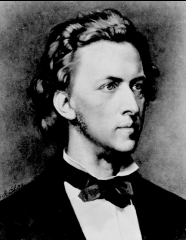

Chopin, Frédéric François (1810-1849), Polish composer and
pianist of the romantic school, regarded by some as the greatest of all
composers of music for the piano. Born Fryderyk Chopin in Zelazowa Wola, near
Warsaw, of a French father and a Polish mother, he preferred to use the French
name Frédéric. He began to study the piano at the age of four, and when he was
eight years old he played at a private concert in Warsaw. Later he studied
harmony and counterpoint at the Warsaw Conservatory. Chopin was also precocious
as a composer: His first published composition is dated 1817. He gave his first
concerts as a piano virtuoso in 1829 in Vienna, where he lived for the next two
years. After 1831, except for brief absences, Chopin lived in Paris, where he
became noted as a pianist, teacher, and composer. He formed an intimate
relationship in 1837 with French writer George Sand. In 1838 Chopin began to
suffer from tuberculosis and Sand nursed him in Mallorca, in the Balearic
Islands, and in France until continued differences between the two resulted in
an estrangement in 1847. Thereafter his musical activity was limited to giving
several concerts in 1848 in France, Scotland, and England. He died in Paris of
tuberculosis.
Nearly all of Chopin's compositions are for piano. Although an expatriate, he
was deeply loyal to his war-torn homeland; his mazurkas reflect the rhythms and
melodic traits of Polish folk music, and his polonaises are marked by a heroic
spirit. Italian opera composer Vincenzo Bellini also influenced his melodies.
His ballades, scherzos, and études exemplify his large-scale works for solo
piano. His music, romantic and lyrical in nature, is characterized by exquisite
melody of great originality, refined-often adventurous-harmony, subtle rhythm,
and poetic beauty. Chopin greatly influenced other composers, notably the
Hungarian pianist and composer Franz Liszt, German composer Richard Wagner, and
French composer Claude Debussy. Chopin's many published compositions include 55
mazurkas, 27 études, 24 preludes, 19 nocturnes, 13 polonaises, and 3 piano
sonatas. Among his other works are the Concertos in E minor and in F minor, both
for piano and orchestra, the cello concerto, and 17 songs.
Art | Biodata | Music | Recipes | Links | Stories | Poetry | Awards | Photos | Games |